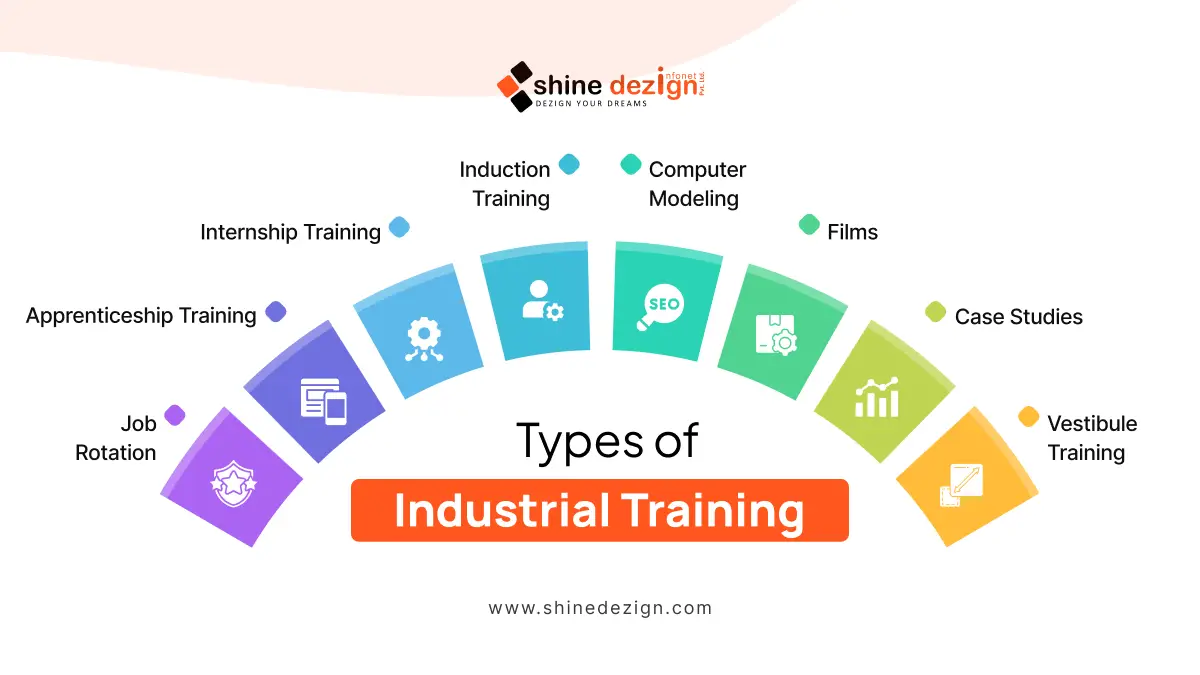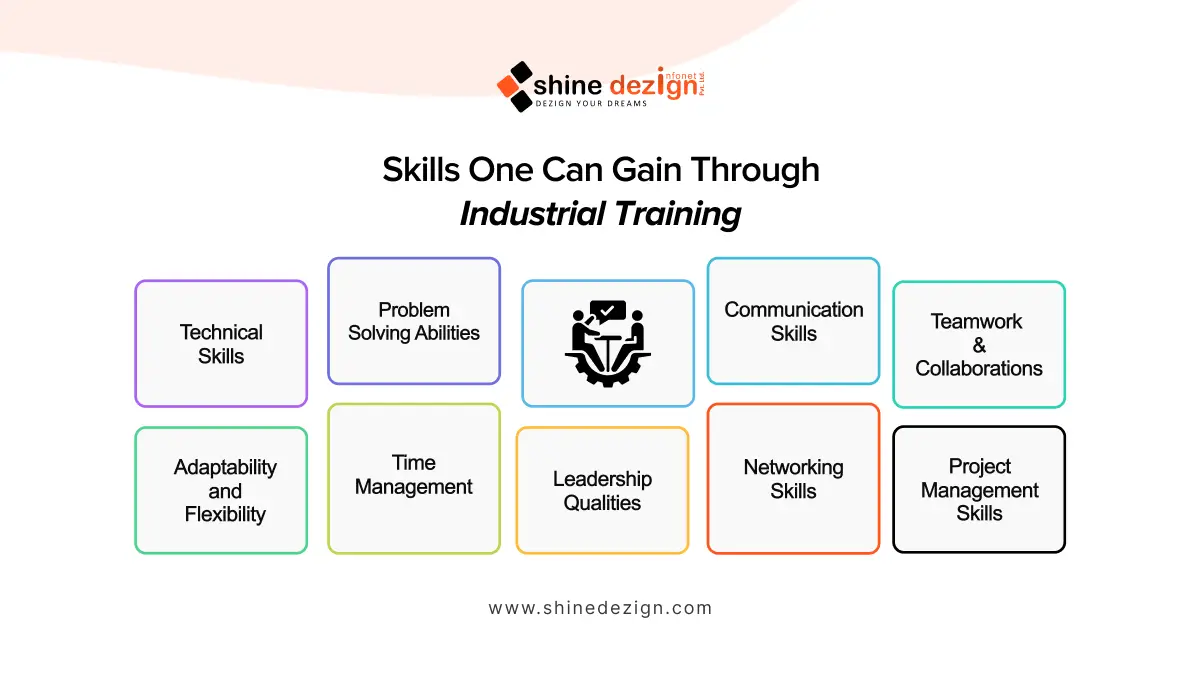Industrial training is an important element for gaining real life workplace experiences for educational and professional development, especially in 2026.
As industries are rapidly advancing in technologies and evolving according to market demands, having work experience is essential to grab opportunities in job market.
This blog will explore the various skills you can gain through industrial training. Along with the benefits of such trainings.
What is Industrial Training?
Industrial training is a structured training program tailored in order to provide students/trainees the practical experience required in any specific industry.
The industrial training center involves hands-on work, mentorship, and exposure to real-world challenges.
The primary goal of industrial training is to bridge the gap between theoretical knowledge and practical skills required in the workplace.
What are the Types of Industrial Training?
There are various types of industrial training:

1. Job rotation:
Job rotation means when employees switch or rotate jobs within the same organization.
2. Apprenticeship training:
The training provided to the employees who wish to join skilled jobs, by the trained professionals to learn the required skills.
3. Internship training:
These are the training programs designed by the universities to provide practical training in companies to the students.
4. Induction training:
In an induction training the new hires are familiarized with the organization and the job, superior and subordinates to make them familiar with the work environment and culture.
5. Computer modeling:
Computerized stimulation techniques are used for training provided to the trainees or employees.
6. Films:
Movies, documentaries and short films are used to showcase skills which cannot be demonstrated to the employees.
7. Case studies:
The employees are given case studies for discussion, and they are expected to take an active part in the discussion.
8. Vestibule training:
This training method is designed for the staff who regularly work with technical equipment like tools, machinery, etc.
Why is Industrial Training Important?
Importance of industrial training:
1. It provides hands-on experience.
2. Trainees develop both technical and soft skills.
3. Trainees can build professional relationships.
4. Employers often prefer candidates with practical experience.
What are the Benefits of Industrial Training?
Benefits of Industrial training are as follows:
1. Hands-On Experience
2. Skill Development
3. Job Readiness
4. Networking Opportunities
5. Confidence Building
6. Understanding Workplace Culture
7. Problem-Solving Skills
8. Career Exploration
9. Resume Boost
10. Potential Job Offers
What are the Skills One Can Gain Through Industrial Training?

1. Technical Skills
Technical skills simplified as specific knowledge and abilities to perform tasks related to any particular job or industry. These skills required hands-on experience and training to gain perfection.
For example, in IT training you will learn languages like Python, Java or C++ or during manufacturing training, you will learn to operate CNC machines or robotics or more.
Real-Life Application of These Skills
In a software development role, having technical skills allows you to write code, debug software, and collaborate with other developers effectively. In manufacturing, operating machinery safely and efficiently is crucial for maintaining production quality.
2. Problem Solving Abilities
It involves the ability to identify issues, analyze the information and find the best solutions. Industrial training trains students or trainees to face real world challenges and develop critical thinking.
Benefits of Developing Problem-Solving Skills
- Breaking down complex problems into fragments to easily solve them.
- Developing critical thinking to foster innovative solutions.
- Enhancing decision making ability and evaluating capability.
Real-Life Application of Problem-Solving Abilities
For example, being in a project management role, you may face some unexpected delays or errors. But your problem-solving skills will help you to analyze the situation and identify alternative solutions.
3. Communication Skills
Communication skills are the primary and most preferable skill required for any job role. Industrial training program provides you with the opportunity to interact with the industry specialists to enhance your technical skills and soft skills like effective communication.
With industrial training one can learn to present ideas clearly and concisely. Effective communication can develop extensive understanding and analyzing capabilities.
Real-Life Application of Communication Skills
In the marketing field, having strong communication skills will enable you to create various strategic presentations for clients, write engaging campaign content, and collaborate with team members to develop strategies.
4. Teamwork & Collaborations
Industrial training fosters the sense of teamwork in students and trainees. It develops collaboration skills in trainees. It helps trainees to understand group dynamics and collective goals.
What are the Benefits of Teamwork Skills?
- Trainees can efficiently manage disagreements and find common issues.
- They can easily understand their strengths.
- They learn to fit into the team.
- It helps in encouraging supportive behavior among team members.
Real-Life Application of Teamwork Skills
For example, in a hospital, nurses, doctors & staff members work in a collaborative way to ensure excellent care for the patients.
5. Adaptability and Flexibility
Trainees need to adapt to frequently changing circumstances and technologies in the workplace. Having the skill of adaptability and flexibility can help them to tackle various situations and challenges.
Real-Life Application of Adaptability and Flexibility Skills
In the workplace, project requirements can change at any time due to changing market trends and client requirements. So being adaptable or flexible towards changes is necessary to ensure proficiency.
6. Time Management
Time management is the most prominent skill required in every field or in every industry. Industrial training helps trainees to learn prioritizing tasks, managing deadlines and handling work pressure to fulfil the long-term goals.
How is Time Management Skill Beneficial?
- It helps trainees to learn to balance multiple responsibilities.
- Developing the ability to set up realistic goals.
- Ability to manage client meetings, follow ups, and administrative tasks.
- Strong time management skills enable us to allocate time efficiently.
7. Leadership Qualities
Industrial training is essential to develop leadership qualities in trainees. Leadership qualities help them to develop tactics to guide and motivate others.
What are the Benefits of Leadership Skills?
Trainees learn to foster a positive work environment among the team members.
- They develop decision-making skills.
- They develop the ability to resolve tasks effectively.
- Leadership training enhances emotional intelligence.
- It allows trainees to understand and manage their own emotions.
8. Networking Skills
With industrial training, trainees or students can get the opportunity to connect with the industry professionals. Developing professional networks is very helpful for career advancement. This is crucial to grab more job opportunities and collaborations to gain valuable insights of industry and your job role.
What are the Benefits of Networking Skills
- Trainees will learn to establish & maintain professional relationships.
- They access to industry knowledge and resources through connections.
- Networking can lead to mentorship opportunities and career guidance.
Real-Life Application of Networking Skills
In the fields like business development, having strong networking skills can help professionals to identify potential clients, partners, and industry trends. This will ultimately derive towards growth and success.
9. Project Management Skills
Project management skills are crucial to learn for trainees. Managing projects can be a difficult task with important operations like execution, planning, and closing and many other factors. Trainees learn to work on project under the mentorship to learn the skill of managing these tasks efficiently.
Benefits of Project Management Skills
- Trainees learn to set clear objectives and timelines.
- They develop the ability to allocate resources effectively and manage budgets.
- Project management skills enhance leadership capabilities.
Real-Life Application of Project Management Skills
For example, a trainee with project management skills can oversee the entire project lifecycle, ensuring that it is completed on time and within budget.
Wrapping Up
Industrial training is the foundation stone of career advance for everyone. Having comprehensive knowledge of work culture, work factors and technologies can help trainees to attain proficiency in their job field.
From having technical skills to fostering adaptability, industrial training provides many benefits to students. By opting for industrial training students can gain valuable insights and experience that can lead them towards growth and success.
Having soft skills like project management, leadership qualities and efficient communication and many more are beneficial for trainees and students.
In short, the skills gained through industrial training are invaluable assets that contribute to personal and professional growth, making it an important component of education and career development in 2026 and beyond.
Your questions, our answers
Industrial training is a training program created to provide students and trainees the practical experience required in any specific industry.
Benefits of Industrial training: It provides hands-on experience. Trainees develop both technical and soft skills. Trainees can build professional relationships. Employers often prefer candidates with practical experience.
Any university graduate or student, Job seekers, and employees can seek for industrial training to enhance their skill set.
Benefits of time management: It helps trainees to learn to balance multiple responsibilities. Developing the ability to set up realistic goals. Ability to manage client meetings, follow ups, and administrative tasks. Strong time management skills enable us to manage time efficiently.
Having knowledge of technologies used in a particular field and ability to adapt with evolving technology are known as technical skills.













